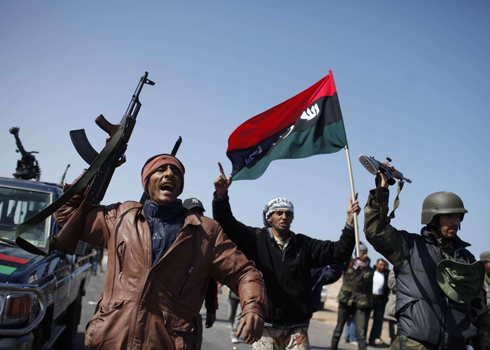The Libyan Ambassador to the United States, who has broken with the ruling regime, is urging the U.S., Britain and France to employ the full extent of a U.N. resolution passed Thursday and use military airstrikes to contain Libyan leader Muammar Qaddafi as soon as possible.
A cease-fire in Libya does not go far enough to quell the humanitarian crisis in the country and the brutal policies of the Muammar Qaddafi’s regime, Ambassador Ali Aujali, who joined the opposition in the early days of the crisis, told reporters Friday morning at the National Press Club.
“A civil or peaceful resolution does not solve the problems,” he said. “Strikes are a necessity. A no-fly zone only doesn’t serve us…[Qaddafi’s] forces must be destroyed.”
The comments come after the Libyan government announced an immediate halt to military operations in the country after the United Nations Security Council passed a resolution Thursday authorizing a no-fly zone and “all necessary measures” to stop Qaddafi’s advances on the eastern holdout city of Benghazi.
Despite the declared ceasefire, Aujali said he doesn’t trust Qaddafi to release his hold on some of the cities that are under siege without water and basic supplies because of the regime’s military actions. Aujali said bombing of the town of Mostrada continued last night after the U.N. resolution was passed and expressed concern that Qaddafi could use chemical weapons against opposition forces if he is not toppled from power.
“This is a man who says either I rule you or I destroy you,” Aly Abuzaakouk, executive director of the Libya Human and Political Development Forum, told reporters Friday. “He is destroying the Libyan investment in its oil fields, he has stockpiled billions in cash so he can hire mercenaries and buy weapons. He should be out.”
President Obama Friday afternoon will make his first comments about the rapidly escalating clash in Libya since the resolution passed the UN.
Secretary of State Hillary Clinton seemed to signal Friday that Qaddafi could remain in power if he backed up its declaration of a cease-fire with action.
“We are going to be not responsive or impressed by words, we have to see actions on the ground and that is not yet at all clear,” Clinton said. “We will continue to work with our partners in the international community to press Qaddafi to leave and to support the legitimate aspirations of the Libyan people.”
When it comes to ending Qaddafi’s hold on power, Clinton said the ultimate goal of ousting him still remains.
“Col. Qaddafi’s refusal to hear the repeated calls up until now to halt the violence against his own people has left us with no other choice but to pursue this course of action,” she said.
Three senior senators who have been calling for a no-fly zone for weeks applauded the U.N. action.
“The administration deserves credit for getting this resolution passed with such strong support,” said a joint statement from Democratic Sen. John Kerry (MA), Republican Sen. John McCain (AZ), and independent Sen. Joe Lieberman (CT). “This was an important step on behalf of the people of Libya, but it will only be as effective as its implementation. With Qaddafi’s forces moving toward Benghazi, we must immediately work with our friends in the Arab League and in NATO to enforce this resolution and turn the tide before it is too late.”
The senators also said they would work to build a strong coalition of support in Congress for Obama to take “decisive measures to stop Qaddafi.”
Other senior senators, such as Sen. Richard Lugar (IN), the ranking member of the Foreign Relations Committee, as well as Intelligence Committee Chairwoman Dianne Feinstein (D-CA) have expressed deep concerns about using military force in another Arab state.
Feinstein, at one point, referred to the conflict as a “civil war.”
Such phrases do not reflect the reality on the ground, Abuzaakouk contends. He said some in Qaddafi’s military are ready to defect and said a provisional government of Libya based in Benghazi is already ready to replace Qaddafi.
Aujali said he would like to hear Obama recognize the provisional government as the sole legitimate authority in Libya. That recognition, he said, would begin the process of the U.S. and others freeing up the assets they froze from Qaddafi’s regime and giving the provisional government a portion of them.
A March 14 letter signed by more than 100 scholars, including professors at Stanford, Georgetown, American University and groups like the Carnegie Endowment for International Peace and Brookings, calls on Obama to join France in recognizing the provisional government as the sole legitimate government of Libya. It also urges him to “issue a clear warning to all military officers and mercenaries supporting the Qaddafi regime that they will be prosecuted to the fullest extent of international law if they participate in crimes against humanity” and “offer protection to any senior officers now loyal to Col. Qaddafi who choose to defect.”
“Mr. President, we now stand at a pivotal moment in the struggle for democracy in the Arab world,” they wrote. “If the words you spoke in Cairo nearly two years ago are to have any meaning, you must now assume a leading role in supporting the massive popular uprising for democracy throughout the region.”






